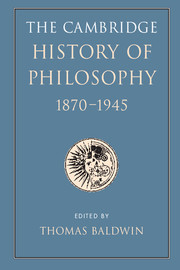Book contents
- Frontmatter
- Contents
- List of contributors
- Introduction
- I 1870–1914
- II 1914–1945
- 8 Logic and philosophy: the analytic programme
- 28 Logical atomism
- 29 The scientific world conception: logical positivism
- 30 The achievements of the Polish school of logic
- 31 Logic and philosophical analysis
- 9 The diversity of philosophy
- 10 Knowledge, language, and the end of metaphysics
- 11 Philosophy and the exact sciences
- 12 Mind and its place in nature
- 13 Philosophy and social science
- 14 Ethics, religion, and the arts
- 15 Law and politics
- Biobibliographical appendix
- Bibliography
- INDEX
- References
30 - The achievements of the Polish school of logic
from 8 - Logic and philosophy: the analytic programme
Published online by Cambridge University Press: 28 March 2008
- Frontmatter
- Contents
- List of contributors
- Introduction
- I 1870–1914
- II 1914–1945
- 8 Logic and philosophy: the analytic programme
- 28 Logical atomism
- 29 The scientific world conception: logical positivism
- 30 The achievements of the Polish school of logic
- 31 Logic and philosophical analysis
- 9 The diversity of philosophy
- 10 Knowledge, language, and the end of metaphysics
- 11 Philosophy and the exact sciences
- 12 Mind and its place in nature
- 13 Philosophy and social science
- 14 Ethics, religion, and the arts
- 15 Law and politics
- Biobibliographical appendix
- Bibliography
- INDEX
- References
Summary
INTRODUCTION
In the most narrow sense, the Polish school of logic may be understood, as the Warsaw school of mathematical logic with Jan Łukasiewicz, Stanisław Leśniewski, and Alfred Tarski as the leading figures. However, valuable contributions to mathematical logic were also made outside Warsaw, in particular by Leon Chwistek. Thus, the Polish school of logic sensu largo also comprises logicians not belonging to the Warsaw school of logic. The third interpretation is still broader. If logic is not restricted only to mathematical logic, several Polish philosophers who were strongly influenced by formal logical results, for example Kazimierz Ajdukiewicz and Tadeusz Kotarbiński, can be included in the Polish school of logic sensu largissimo. Polish work on logic can therefore encompass a variety of topics, from the ‘hard’ foundations of mathematics (e.g. inaccessible cardinals, the structure of the real line, or equivalents of the axiom of choice) through formal logic, semantics, and philosophy of science to ideas in ontology and epistemology motivated by logic or analysed by its tools. Since the development of logic in Poland is a remarkable historical phenomenon, I shall first discuss its social history, especially the rise of the Warsaw school. Then I shall describe the philosophical views in question, the most important and characteristic formal results of Polish logicians, their research in the history of logic, and applications of logic to philosophy. My discussion will be selective: in particular I will omit most results in the ‘hard’ foundations of mathematics.
- Type
- Chapter
- Information
- The Cambridge History of Philosophy 1870–1945 , pp. 401 - 416Publisher: Cambridge University PressPrint publication year: 2003
References
- 2
- Cited by



